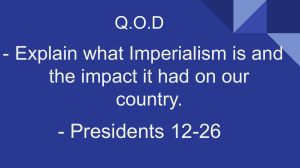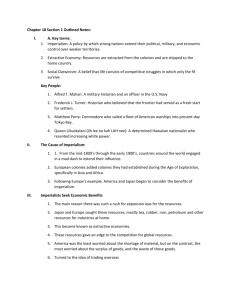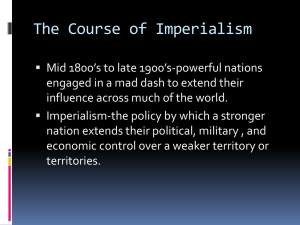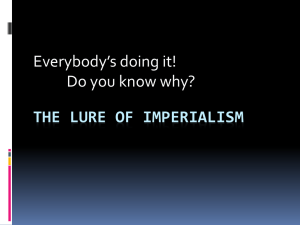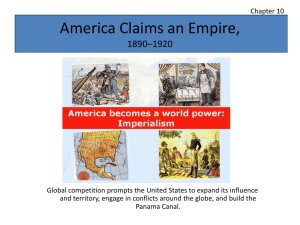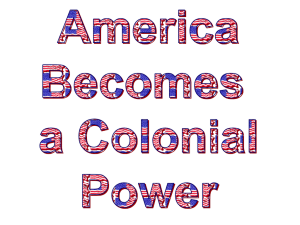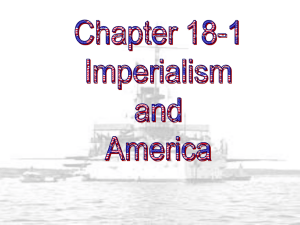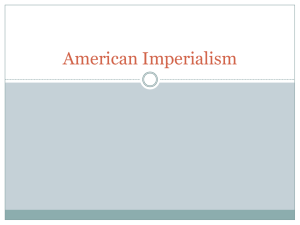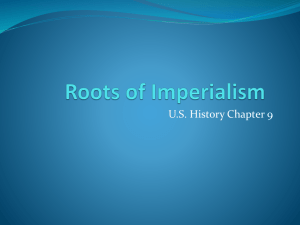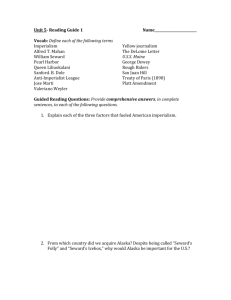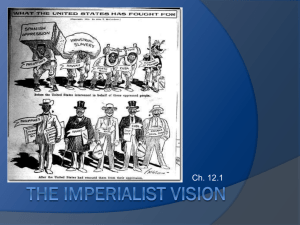chapter 18 section 1 notes b
advertisement
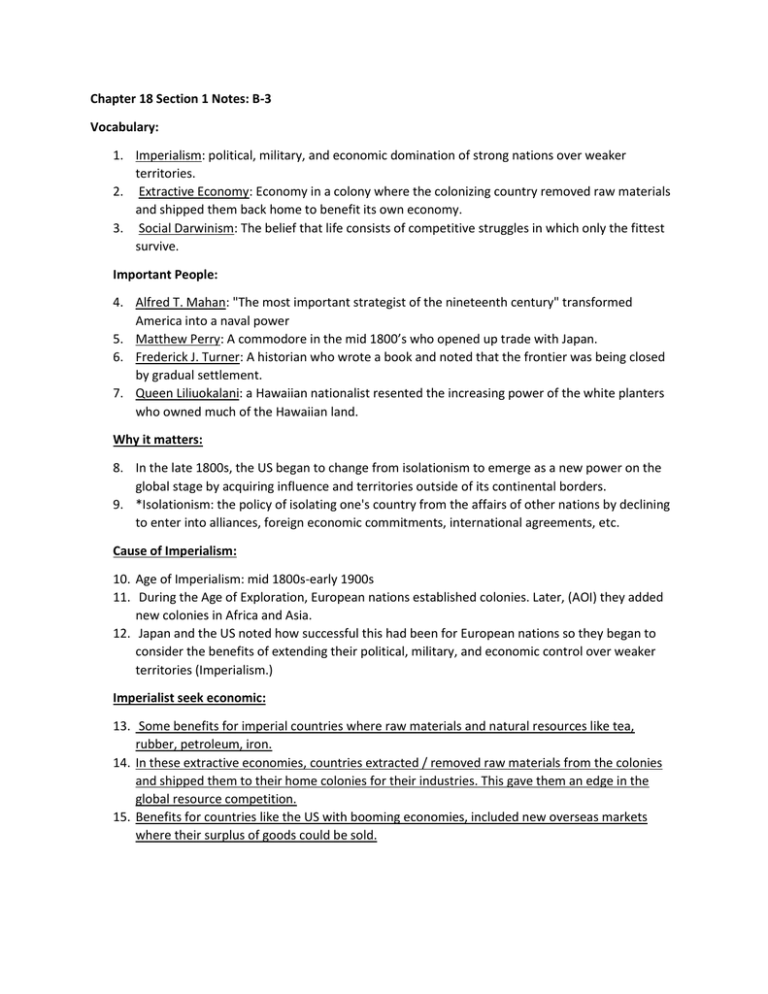
Chapter 18 Section 1 Notes: B-3 Vocabulary: 1. Imperialism: political, military, and economic domination of strong nations over weaker territories. 2. Extractive Economy: Economy in a colony where the colonizing country removed raw materials and shipped them back home to benefit its own economy. 3. Social Darwinism: The belief that life consists of competitive struggles in which only the fittest survive. Important People: 4. Alfred T. Mahan: "The most important strategist of the nineteenth century" transformed America into a naval power 5. Matthew Perry: A commodore in the mid 1800’s who opened up trade with Japan. 6. Frederick J. Turner: A historian who wrote a book and noted that the frontier was being closed by gradual settlement. 7. Queen Liliuokalani: a Hawaiian nationalist resented the increasing power of the white planters who owned much of the Hawaiian land. Why it matters: 8. In the late 1800s, the US began to change from isolationism to emerge as a new power on the global stage by acquiring influence and territories outside of its continental borders. 9. *Isolationism: the policy of isolating one's country from the affairs of other nations by declining to enter into alliances, foreign economic commitments, international agreements, etc. Cause of Imperialism: 10. Age of Imperialism: mid 1800s-early 1900s 11. During the Age of Exploration, European nations established colonies. Later, (AOI) they added new colonies in Africa and Asia. 12. Japan and the US noted how successful this had been for European nations so they began to consider the benefits of extending their political, military, and economic control over weaker territories (Imperialism.) Imperialist seek economic: 13. Some benefits for imperial countries where raw materials and natural resources like tea, rubber, petroleum, iron. 14. In these extractive economies, countries extracted / removed raw materials from the colonies and shipped them to their home colonies for their industries. This gave them an edge in the global resource competition. 15. Benefits for countries like the US with booming economies, included new overseas markets where their surplus of goods could be sold. Imperialists Stress and Military Strength: 16. In Alfred Mahan’s book, The Influence of Sea Power Upon History, he asserts that since ancient times great nations owed their greatness to the natives. 17. America would need to acquire foreign bases so ships could refuel and gather supplies. He also suggested building a canal across Central America so ships could move quickly between the Atlantic and Pacific oceans. Because of Mahan the Panama Canal was built. 18. By 1900, the United States had the third largest navy in the world. Imperialists Believe in National Superiority: 19. Imperialists worldwide used racial, national, and cultural superiorities to justify imperialism 20. Many Americans thought that America wouldn’t survive if Europe took the rest of the world 21. Americans also believed in Manifest Destiny and that God had granted them the right to expand to the Pacific Ocean Imperialists Believe in National Superiority: 22. Our Country a book by Josiah Strong kept with the theme of expansion The Significance of the Frontier in American History by Frederick Jackson Turner said that the frontier was for ambitious American settlers. The settlers also helped with potential disconnect and once we settled the frontier Turner thought we needed more land. U.S. Power Grows in the Pacific: 23. In 1853, Matthew Perry sent a Fleet of warships to Tokyo Bay, Japan. 24. Perry opened up trade with Japan by showering them with gifts and having the Japanese come to realization that not trading with other countries they fell behind in Military technology. 25. After the treaty was made to open trade with Japan, Americans wanted further expansion in the Pacific. Seward Purchases Alaska: 26. Secretary of State, William Seward, purchased Alaska from Russia for $7.2 million. 27. Alaska was referred to as “Seward’s Icebox” and “Seward’s Folly” 28. People didn’t understand why they needed a vast tundra of ice and snow until it was found to be rich in resources such as, timber, oil, and others. 29. Alaska doubled America’s size 30. The purchase is thought of as a key milestone in America’s road to power U.S Influence In Latin America Grows: 31. Businessmen saw Latin America as a natural place to expand their trade and investments. 32. Secretary at State, James Blaine, Sponsored the First International Pan-American Conference in 1889. 33. It established the International Union of American Republics, later known as the Pan-American Union. 34. The conference also paved the way for the Pan-American Highway system. This then linked the United States to Central and South America. 35. In 1895, America and Great Britain got into a border disputes between British Guiana and Venezuela, with America claiming that Britain was violating the Monroe Doctrine. American Planters Increase Power: 36. 37. 38. 39. 40. 41. In the 1890’s American planters in Hawaii face two crisis’s The new tariff law imposed duties on previously duty free Hawaiian sugar This made sugar more expensive than sugar in the United States Sugar growers in Hawaii feared the would suffer decreasing profits King Kalakaua died leaving his sister, Queen Liliuokalani , as ruler She resented the White planters who were gaining power and owning much of the Hawaiian land 42. She decided to abolish the constitution stating that the white minority had power 43. They overthrew the Queen and wealthy planter Stanford B. Dole lead the new government asking president Benjamin Harrison to annex Hawaii United States Annexes Hawaii: 44. President Harrison signed the treaty for annexation of Hawaii but couldn’t get the senate to approve before Grover Cleveland. 45. Cleveland ordered a full investigation and found out that many of the Hawaiians didn’t want the treaty. 46. With the push of many Americans, William McKinley, and the outbreak of the Spanish American War Hawaii became a U.S. Territory.
